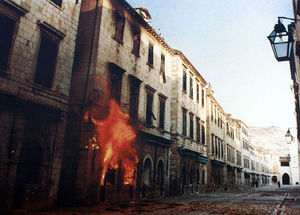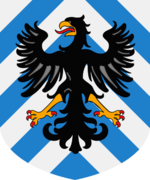Second Tarperti Civil War
| This page is a work in progress by its author(s) and should not be considered final. |
| Second Tarperti Civil War | |||||||
|---|---|---|---|---|---|---|---|
 Old city of Bergfeld during its 9 month long siege. |
|||||||
|
|||||||
| Belligerents | |||||||
Supported by |
|
||||||
| Commanders and leaders | |||||||
|
|
||||||
| Strength | |||||||
| 270,000 | 195,000 | ||||||
| Casualties and losses | |||||||
| 5,456 soldiers killed | 8,784 soldiers killed | ||||||
|
|||||||
The Second Tarperti Civil War, Also known as the Plamyadien Sixth Conquest, and originally known as the Hinderist War, also widely known in Tarper simply as The Civil War or The War, took place from 2000 to 2002. The Revolutionaries, who were comprised of members of the leftist Tarperti Underground, Plamyadia, Sanghelios, and Comico, fought against the Hiderists or Republicans, they were fascists, nazis, and largely nationalistic conservative group led by President Mans Hinder. The war has often been portrayed as a struggle between democracy and fascism, but it can more accurately be described as a struggle between leftist revolution and rightist counter-revolution. Ultimately, the Revolutionaries won, and rebuilt the nation into a socialist federation.
The war began after a military invasion by the Plamyadien Convention (Plamyadia, Comico, Sanghelios, and Tarperti Underground), originally under the leadership of Guillaume Martin, against the fascist government of the Republic of Tarper, at the time under the leadership of President Mans Hinder. The Revolutionary group was supported by a number of leftist groups, including the Communist Party of Tarper (CPT), anarchists such as the National Worker's Confederation (NWC), and the New Millennium Party (NMP), a socialist group.
The invasion started in the north of Tarper which ended up having a positive opinion of the invaders. However, the south of Tarper kept a mixed or favorable view of Hinder's government. Tarper was thus left militarily and politically divided. The Revolutionaries and the Republicans government fought for control of the country. The Republican forces were left economically isolated and received no foreign support, while the Revolutionary side received support from the Communist Skerieyvos and leftist Plamyadia.
The Revolutionaries advanced from their strongholds in the north and west, capturing most of Tarper's western valleys in 2001. They also besieged Terraum and the area to its south and east for much of the war. After large parts of Astra were captured in 2001 and 2002, the war ended with the victory of the Revolutionaries and the execution and incarceration of thousands of fascist Tarps, many of whom fled to mountain villages in southern Skerieyvos. Those associated with the losing Republicans were persecuted by the victorious Revolutionaries. With the establishment of a democracy led by Tony Castilla in the aftermath of the war, all right-wing parties were outlawed via parliamentary acts.
The war became notable for the passion and political division it inspired and for the many atrocities that occurred. Organized purges occurred in territory captured by Hinder's forces so they could consolidate their future regime. A significant number of killings took place in areas controlled by the Revolutionaries. The extent to which Revolutionary authorities took part in killings in Revolutionary territory varied.
Contents
Causes
Plamyadien Convention
Outbreak and invasion
Attack on Citrone
First months
Public reaction
Underground movement
Dissolution of the Republic
International recognition of the National Confederation
Mutiny by the Army
Independence of northern territories
Citrone Covention
Northern Alliance
International recognition
Later stages
Treaty of Espace Réservé
Aftermath
Excecution of Mans Hinder
Reconstruction
Covenant Alliance
Impact on Tarperti Culture
| ||||||||||||||||||||||||||||||||||||||||||

